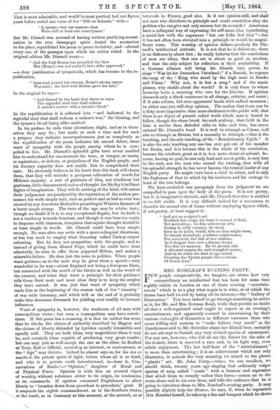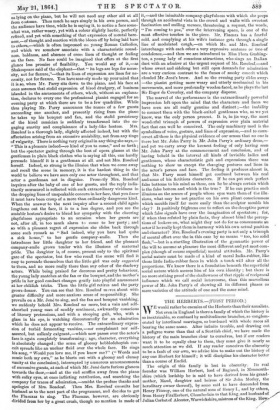MRS. ROSELEAF'S EVENING PARTY.
FEW people comparatively, we imagine, are aware how very extraordinary an intellectual feat has been for some time nightly visible in London at one of those evening " entertain- ments " which is to a play what negus is to wine, or at which the drama loses half its evil by losing all its interest,—the "Gallery of Illustration." You have indeed to go through something to arrive at it, for Mr. and Mrs. German Reed, while they provide no doubt all that a well-regulated mind ought to expect at an evening's entertainment, and apparently succeed in entertaining by their various rgehauffes of themselves in different costumes those who come willing and anxious to "make believe very much" as the Marchioness said to Mr. Swiveller about her diluted beer, certainly do not attempt to furnish any very refined species of amusement. For any one, however, who will sit out the dinner for the sake of the dessert, there is reserved a rare and, in its light way, even subtle enjoyment. The last half-hour of the " entertainment " is more than entertaining ; it is an achievement which not only illustrates, it extends the very meaning we attach to the phrase " plastic " art. Mr. John Parry,—whorn we can recollect, we should think, twenty years ago singing that ordinarily vulgar species of song called " comic " with a humour and expression that allied them to comedy rather than farce,—comes on to the scene alone and in his own dress, and tells the audience that he is going to introduce them to Mrs. Roseleaf's evening party. It may possibly slightly help the illusion, he says, if, when he represdnts Mrs. Roseleaf herself, he takes up a fan and bouquet which he shows us lying on the piano, but he will not need any other aid at all from costume. Thus much he says simply in his own person, and the audience have time, while he is saying it, to notice a face some- what wan, rather weary, yet with a colour slightly hectic, perfectly refined, and yet with something of that expression of mental bare- naisi,—of thought and emotion with the bloom off by being laid bare to others,—which is often impressed on young Roman Catholics, and which we somehow associate with a characteristic round- ness, baldness, and absence of cross lines of thought or feeling on the face. No face could be imagined that offers at the first glance less promise of flexibility. You would say of it,—as Shakespeare said of the elephant—that "its legs are legs for neces- sity, not for flexure,"—that its lines of expression are lines for ne- cessity, not for flexure. You have scarcely made up your mind that it is so, when Mr. Parry sits down to the piano, and his face at once assumes that stolid expression of hired drudgery, of business islanded in the amusements of others, which, without an explana- tion, declares to every one the professional pianist engaged for an evening party at which there are to be a few quadrilles. While thus playing Mr. Parry announces the names of a few guests succeeding one another, and presently rising from the piano he takes up his bouquet and fan, and the stolid persistency of the hired musician is suddenly transformed into the en- gaging suavity and complaisance of a lady-like hostess. Mrs. Roseleaf is a thorough lady, slightly affected indeed, but with the affectation arising from an excessive amiability, not from any tinge of vulgarity. There is nothing very original in any thing she says,- -" This is a pleasure indeed—so kind of you to come," and so forth ; but the spectator gazing through the best of opera glasses at the gentleman in plain black clothes who is saying all this, can hardly persuade himself it is a gentleman at all, and not Mrs. Roseleaf herself. Indeed, so strong is the illusion that when we come away and recall the scene in memory, it is the hardest thing in the world to believe we have seen only one actor throughout, and that actor a gentleman not in disguise. Presently Mrs. Roseleaf inquires after the baby of one of her guests, and the reply indis- tinctly murmured is reflected with such extraordinary vividness in the dropping lines of unspeakable concern in her face, that you know it must have been croup of a more than ordinarily dangerous kind. When the answer to the next inquiry after a second child again lengthens out the face, it is to a less degree, and you see the amiable hostess's desire to blend her sympathy with the cheering playfulness appropriate to an occasion when her guests are not, after all, in too much alarm to come to her party ; and so with a pleasant regret of expression she slides back through some such remark as "Sad indeed, why you have had quite a sick house," to her gentle company-smile. Then she introduces her little daughter to her friend, and the pleasant ,company-smile grows tender with the illusions of maternal pride. The daughter is, of course, present only to the spiritual gaze of the spectator, but few who recall the scene will find it easy to persuade themselves that the little girl was only suggested to them, and no more really there than any other of the shadowy actors. While being praised for decorous and pretty behaviour, the young lady snatches at the fan or the bouquet, and the mother's pride in her good conduct changes gently into playful amusement at her childish tricks. Then the little girl retires and the party grows denser. You can see that Mrs. Roseleaf moves about with greater difficulty and more anxious sense of responsibility. She prevails on a Mr. Jene to sing, and the fan and bouquet vanishing, we suddenly behold Mrs. Roseleaf no more, but a vain and self- absorbed young man of muddy sentiment, awkwardly conscious of literary pretensions, and with a stooping gait, who, with a glass in his eye, is watching discontentedly for an admiration which he does not appear to receive. The extraordinary expres- sion of turbid fermenting vauities,—not complaisant nor self- assured, but sullenly exigeant,—which now passes over the actor's face is again completely transforming ; age, character, everything is absolutely changed ; the scum of gloomy hobbledehoyish con- ceit spreads like an unclear fluid over the whole face. He sings his song, "Would you love me, if you knew me?" (" Words and music both my own," as he blurts out with a gloomy and clumsy vanity at the conclusion), interrupted by numerous announcements of successive guests, at each of which Mr. Jene darts furious glances towards the door,—aud at the end scuffles away from the piano with sulky eyes, at once inflicting retribution, and searching the company for traces of admiration,—amidst the profuse thanks and apologies of Mrs. Roseleaf. Then Mrs. Roseleaf consults her husband as to the next part of the programme, and decides to get the Fluenzas to sing. The Fluenzas, however, are obviously divided from her by a great crush, though no mention is made of it,—and the inimitable company-playfulness with which she peeps through an accidental vista in the crowd and wafts with sweetest fascination and smiling menace, threatening a request, the words, "I'm coming to you," over the intervening space, is one of the most effective touches in the piece. Mr. Fluenza has a fearful cold, and complying at his wife's instance gets through a single line of modulated cough,—on which Mr. and Mrs. Roseleaf interchange with each other a very expressive sentence or two of condolence,—and then we are introduced to Miss Flora Gushing- ton, a young lady of conscious attractions, who sings an Italian duet with an admirer at the urgent request of Mr. Roseleaf,—and whose sweet and sidelong but still open demands for admiration are a very curious contrast to the fumes of smoky conceit which clouded Mr. Jene's brow. And so the evening party slides away, —the pianist getting more weary and utterly mechanical in his movements, and more profoundly wooden-faced, as he plays the last Sir Roger de Coverley, and the company disperse.
The marvel of the performance is the extraordinarily powerful impression left upon the mind that the characters and faces we have seen are all really genuine and distinct ;—the inability to connect them with the black-suited gentleman who, as we yet know, was the only person present. It is, in its way, the most wonderful triumph of powers of expression over plain material fact that can well be conceived. The only machinery used is the symbolism of voice, gesture, and lines of expression,—and to coun- teract all these is the physical evidence of our senses that no one is there but Mr. John Parry in Mr. John Parry's ordinary dress,— and yet we carry away the keenest feeling of only having seen Mr. John Parry at the commencement and conclusion, and of having beheld in the interval all kinds of invisible ladies and gentlemen, whose characteristic gait and expressions there was nothing to show us except the changing postures and lines in the actor's person and face. 'The feeling it produces almost is, that Mr. Parry must himself get confused between his real and some of his fictitious characters. If he can put such perfect false bottoms to his mind as these, can he be always certain which is the false bottom and which is the true ? If he can practise such illusions on the senses of people whose eyes warn them of the illu- sions, what may he not practise on his own pliant consciousness which moulds itself far more easily than the sculptor moulds his clay? It positively frightens one to reflect on the deceptive power which false signals have over the imagination of spectators ; for, if when thus refuted by plain facts, they almost blind the percep- tions of lookers-on, what might they not do for as consummate an actor if he really kept them in harmony with his own actual position and character? Mrs. Roseleaf's evening party is not only a triumph of mental effort over the in this case by no means "too, too solid flesh,"—but is a startling illustration of the gymnastic power of the will to assume at pleasure the most different and yet most com- plex (though of course superficial) mental attitudes. Mr. Parry's social nature must be made of a kind of moral India-rubber, like those little India-rubber faces in which a touch will alter all the proportions. We know there is a foundation beneath the superficial social nature which assures him of his own identity ; but there is no more striking proof of the shallowness of that ripple of reciprocal influence which we call social intercourse, than this marvellous power of Mr. John Parry's of showing all its different phases as mere varieties of the attitude of one and the same mind.































 Previous page
Previous page